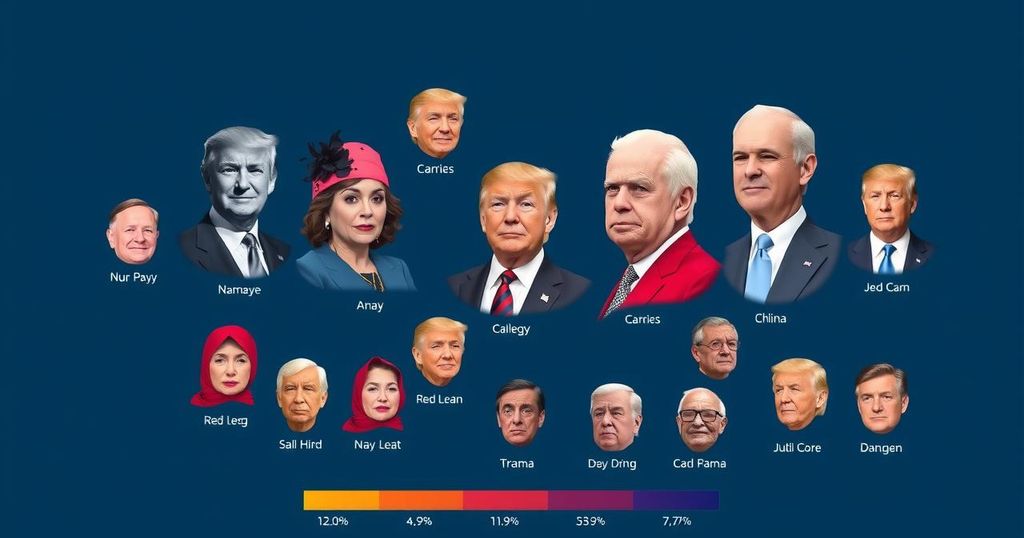Global Leaders’ Preferences in the U.S. Presidential Election: Trump or Harris?

The upcoming U.S. presidential election has gained the attention of world leaders who may have varying preferences between Democratic Vice President Kamala Harris and former Republican President Donald Trump. While Putin seems to favor Trump for a softer stance on Russia, many European leaders lean towards Harris due to concerns about NATO and alliance stability. Other leaders, like Netanyahu, appear to prefer Trump, reflecting previous amicable relations, whereas Modi remains non-committal, recognizing bipartisan U.S.-India ties. The outcome could significantly impact global diplomacy and policy.
As the United States presidential election draws near, with Democratic Vice President Kamala Harris and former Republican President Donald Trump positioned in a tightly contested race, global leaders are keenly observing the developments. The election outcome holds significant implications not just for America but for international relations as the U.S. wields considerable influence on global affairs. Various world leaders have expressed their preferences, which offer insights into their geopolitical aspirations. For instance, Russian President Vladimir Putin appears to favor Trump, reasoning that he would be softer on Russia regarding military support to Ukraine. Experts suggest that Putin views Trump favorably, perhaps recognizing traits he himself exhibits, such as an authoritarian style that undermines Western democratic institutions. On the contrary, Xi Jinping of China has not officially expressed support for either candidate. Trump’s administration initiated a trade war and implemented tariffs on Chinese goods, while Biden maintained a firm stance against China, suggesting that continued tensions may persist regardless of who wins. Additionally, Israeli Prime Minister Benjamin Netanyahu is believed to prefer a Trump victory, given their previously cordial relationship. During Trump’s term, he was perceived as a strong ally to Israel, but political dynamics shifted with Biden’s administration, which has been supportive of Israel amid its ongoing conflict in Gaza. European leaders predominantly seem to align with Harris, reflecting concerns about Trump’s approach to NATO and international collaboration on issues such as climate change. Countries in Europe express anxiety over Trump’s past remarks and actions that could weaken alliances. Indian Prime Minister Narendra Modi holds a more neutral stance, recognizing bipartisan support for deepening U.S.-India relations. Indian officials seem cautious about Trump’s unpredictable style while valuing continuity associated with Harris and the Biden administration. In the Asia-Pacific, South Korea, Japan, and Australia are also assessing the potential repercussions of the election outcome on their respective ties with the U.S. South Korea’s preference remains unclear, although Biden’s policies have favored strong bilateral relations. Japan anticipates possible shifts in U.S. focus under Trump, while Australia is apprehensive about the implications of a Trump victory on climate strategy and trade dynamics with China. In summary, the international community is closely monitoring the U.S. presidential election, with world leaders possessing varied preferences based on their national interests and existing relationships with the U.S. The outcome may considerably impact global alliances, trade policies, and geopolitical strategies.
As the U.S. presidential election on November 5 approaches, stakes are high, not just for American citizens but for world leaders who are attentive to the implications the election outcome may have on their nations. The candidacy of Kamala Harris, representing the Democratic Party, stands in competition with the former president Donald Trump, the Republican nominee. With U.S. foreign policy significantly shaping global politics, reactions from world leaders vary based on their nations’ interests, reflecting both support and reservations about either candidate. Putin’s apparent preference for Trump, Xi Jinping’s ambiguous stance, and the mixed opinions from leaders like Netanyahu and Modi illustrate the complex landscape of international relations influenced by U.S. electoral outcomes.
In conclusion, the imminent U.S. presidential election has triggered a spectrum of reactions from global leaders, each reflecting their country’s strategic interests. While Putin may find an ally in Trump, many European leaders seem to favor Harris, hoping for stronger transatlantic ties. Modi remains neutral, sensing continuity with either administration. The perspectives of other countries reveal the multifaceted nature of U.S. foreign policy and its critical influence on international relations in a rapidly evolving geopolitical landscape.
Original Source: www.aljazeera.com







